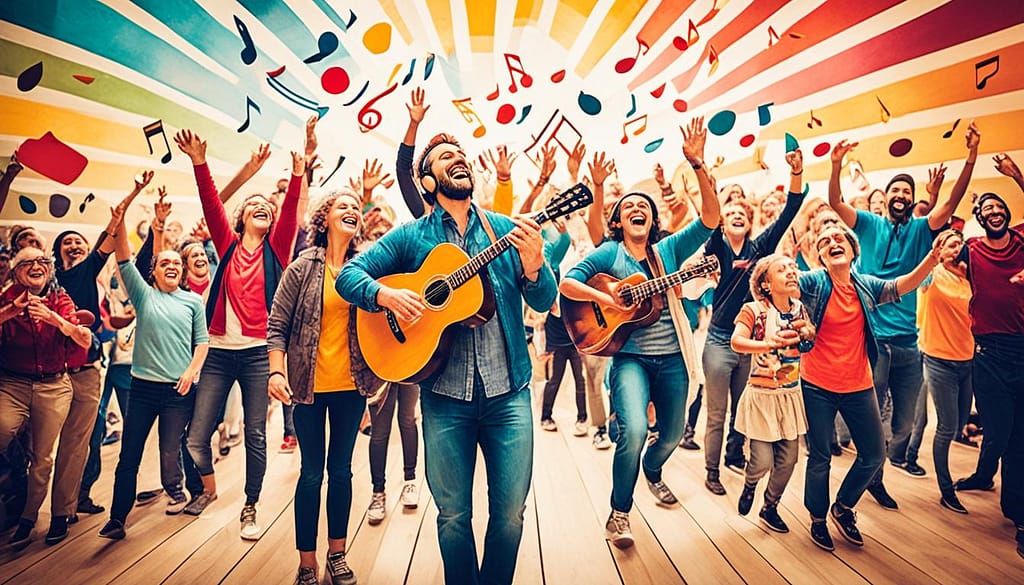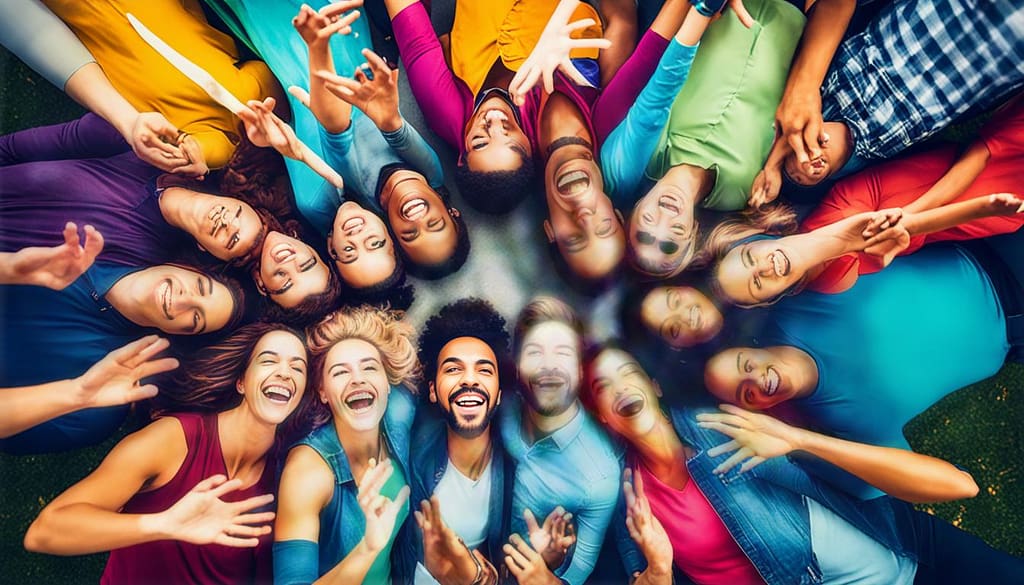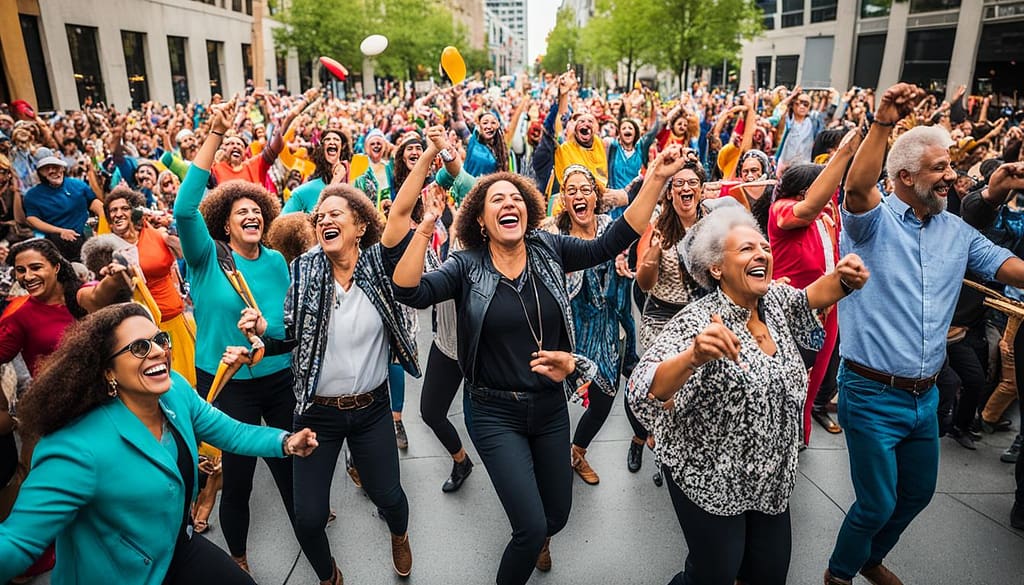Picture a busy city square filled with the sound of drums. People of all ages move together, lost in the joy of the music. Music has a unique power to bring people together, creating connections that go beyond words.
Music has always been a key part of our lives. It’s a language that everyone can understand, no matter where they’re from. Whether you’re singing at a concert, playing with friends, or just tapping your foot, making music together has big social benefits.
Key Takeaways
- Music creates a shared experience and sense of connection, fostering social bonds.
- Coordinating with others musically promotes positive feelings and trust.
- Music releases the bonding hormone oxytocin, strengthening emotional connections.
- Shared musical experiences cultivate a sense of belonging and community.
- Music plays a crucial role in human social development from infancy onwards.
Music as a Social Magnet
Music has a special way of bringing people together. It creates a shared experience and deep connection. Whether it’s the loud crowd at a concert, the voices in a choir, or the dance floor rhythm, music helps form social bonds and community ties.
Shared Musical Experiences
When people come together to enjoy music, they join a collective experience. This shared love for melodies and rhythms creates a sense of unity and belonging. It leads to lasting memories and social connections that go beyond the event.
Music’s role in music and community building is clear. It sparks social interaction at events like block parties and festivals. Music lets people connect with their community and celebrate their shared music and cultural expression.
“Music has the power to bring people together in a way that few other art forms can. It creates a shared experience that transcends language, culture, and background.”
Music’s social benefits aren’t just for big events. Even small gatherings, like in a living room or a spontaneous jam, can build camaraderie and deeper connections.
Music helps create strong social bonds. It’s a powerful tool for building and strengthening communities. This leads to a more connected and resilient society.
Synchronization and Cooperation
Trying to sync up with others in music, like keeping the same beat, can make you feel good and build trust. This connection is linked to the release of pleasure chemicals in your brain. Being in a group, like a band or choir, means you all have to work together. This teamwork can make trust grow and help you work better together in other parts of life.
Here are some ways making music with others can be good for you:
- Enhanced Positive Emotions – Syncing up with others through music makes you feel happy and well.
- Improved Trust – Working together in music builds trust among group members as you depend on each other.
- Strengthened Social Bonds – Sharing music experiences makes you feel closer and part of a group.
These findings show that music and cooperation do more than just make fun times. Being in musical activities with others can really help your social cohesion and happiness.
“Music has a power of forming an association among the members of a community.”
Being part of musical activities can make your connections with others stronger and build a sense of community. Whether it’s playing an instrument, singing, or going to a concert, these social benefits of music can change your life for the better.
The Bonding Hormone: Oxytocin
Oxytocin, the bonding hormone, is key to the social benefits of music. It helps create strong emotional bonds and trust between people. Studies show that music greatly affects oxytocin levels in our brains.
A study found oxytocin levels went up in both new and experienced singers after 30 minutes of singing. This was true even if they didn’t feel happy. This shows that making music together, for fun or performance, can really change our social and emotional health.
Music and oxytocin are closely linked, showing how music helps us bond emotionally. Making music together can increase the “love hormone,” making our social connections stronger. This helps communities come together and feel like they belong.
“Music has a unique ability to foster social connections and build trust between people. The release of oxytocin during musical activities is a testament to the profound impact of what are the social benefits of music.”
Looking into the science of music’s social benefits, oxytocin is a key player. It helps music act as a social glue, bringing people together with empathy, cooperation, and a sense of community.
Empathy and Theory of Mind
Music is more than just beautiful sounds and beats. It deeply affects how we understand others and feel empathy. It makes our brains work harder to grasp the feelings and thoughts of others, known as “theory of mind.”
Listening to music isn’t just passive. Our brains work hard to understand the emotions behind the music. This helps us connect with others on a deeper level, thanks to empathy. Empathy lets us feel and share the feelings of others.
Research shows that when we think a song is made by a human, certain brain areas light up. These areas are linked to understanding others. This means we don’t just hear music; we try to grasp its deeper meaning and connect with the artist.
“Music doesn’t just touch our ears, it resonates with our emotions and social cognition, fostering a deeper understanding of the human experience.”
Music does more than entertain us. It boosts our empathy and understanding of others. This helps us get along better with people, making our social lives richer and more meaningful.

Whether it’s a slow ballad or an upbeat dance track, music connects us. It helps us share feelings and understand each other better. By doing this, music makes us more empathetic and connected, creating a world where we’re closer to each other.
Fostering a Sense of Community
Music has a unique power to unite people and build a strong community feeling. Sharing musical moments, like singing or going to concerts, creates a sense of togetherness. It makes us feel like we belong and are safe together. Research shows that our musical tastes link closely with our values and beliefs. This makes music a key element that can connect different cultures.
When families or friends share a love for music, they feel more connected. Even in cultures that value individuality less, music helps people stick together. Making music with others releases oxytocin, also known as the “bonding hormone.” This hormone strengthens our social bonds and sense of community.
Activities like singing in a choir, playing in a band, or attending music festivals let people connect and work together. Music and social cohesion are closely linked. Making or enjoying music together deepens our sense of shared identity and belonging.
“Music is a universal language that brings people together, transcending cultural barriers and creating a sense of community that is truly unparalleled.”
Using music’s social benefits can help communities feel more united and empathetic. Music and cultural expression can be a strong force for social unity. They help bridge gaps and make our connections stronger.
So, when you’re tapping your foot or singing along to a song, remember. You’re not just enjoying the music. You’re also helping build the strong connections that make our communities.
what are the social benefits of music
Music brings people together, creating a sense of community and strengthening bonds. It’s a universal language that can enrich your life and those around you.
Music’s main social benefit is its ability to create shared experiences. When people gather to listen, sing, or play, they bond over a common interest. This shared moment builds trust, empathy, and a sense of belonging.
Music also promotes positive feelings and strengthens social ties by requiring coordination and cooperation. Working together, like keeping a beat or harmonizing, fosters trust and teamwork. This is especially good for kids, helping them learn important social skills.
Music helps create a sense of community too. Events like concerts or choir performances bring people together, making them feel connected. These experiences bridge cultural and social gaps, uniting people in their love for music.
Moreover, music stimulates the brain circuits that help us understand and empathize with others. By engaging with music, we gain a deeper insight into others’ emotions. This can lead to more meaningful connections.
In conclusion, music offers many profound social benefits. It builds trust, cooperation, and a sense of community. Music also promotes empathy, enriching our social lives and strengthening our connections with others.
| Social Benefit | Description |
|---|---|
| Shared Experience | Music creates a collective emotional response, building trust and a sense of belonging. |
| Coordination and Cooperation | Coordinating with others musically promotes positive feelings and strengthens social ties. |
| Sense of Community | Shared musical experiences can transcend cultural boundaries and foster a strong sense of togetherness. |
| Empathy and Understanding | Engaging with music can develop our ability to understand and empathize with others. |
“Music is a language that doesn’t speak in particular words. It speaks in emotions, and if it’s in the bones, it’s in the bones.” – Keith Richards
Music and Human Social Development
Music is key from the start of life, helping to build strong social ties, improve language skills, and boost well-being. It shows how music deeply affects our social and thinking skills.
The Origins of Musical Bonding
Modern music started with the special talks between mothers and babies, called “motherese.” These musical chats strengthen the bond between adults and kids. They also help babies learn language. The music in motherese, with its big pitch, rhythm, and tempo, grabs the baby’s attention. This sets the stage for a lifelong love and understanding of music.
As we get older, making music, singing, or just listening can make us feel good and connected. Music takes us back to our first social moments, making us feel safe and part of a group. The social perks of music aren’t just for kids; it helps with personal growth and therapy at all ages.
Playing music is fun and good for our minds and bodies. It can ease stress and make us feel more relaxed and happy. This helps us connect better with others and build strong social ties.
“Music has a way of reaching the deepest parts of the human experience, forging bonds and fostering a sense of community that transcends language and culture.”
Music isn’t just for kids; it’s important for growing and healing at any age. By seeing how music connects with us socially, we value its power in our lives and communities more.
Modern Communities and Music
In today’s diverse communities, music is key for bringing people together and building a sense of unity. Outdoor musical instruments and parks make it easy for everyone to enjoy music. This helps people of all ages and backgrounds feel connected.
Music can help change society for the better or worse. Community music therapy uses music to make people feel closer. It helps communities express their culture, form stronger bonds, and feel like they belong.
Outdoor musical parks and instruments are great for building community and making new friends. These places let everyone, no matter their age or background, share their love for music. It’s a way to connect with others through something we all enjoy.
Music and culture go hand in hand. Community music projects help keep local traditions alive. By valuing the social benefits of music, communities can grow more understanding and united.
| Benefits of Community Music Engagement | Examples of Inclusive Musical Initiatives |
|---|---|
|
|
“Music has the power to bring people together, transcending barriers and fostering a sense of community that is essential for the well-being of modern societies.”
By using the social benefits of music, modern communities can become more welcoming and connected. Through music, people from different backgrounds can come together. They can celebrate their culture and build strong relationships, making their community stronger.
Outdoor Musical Instruments
Outdoor musical instruments and parks are changing communities across the United States. They bring people together with shared musical experiences. This is thanks to innovative installations like those from Percussion Play.
These instruments are for everyone, no matter the age or ability. They make music-making fun and open to all in public places. This creates a space where people can meet, connect, and share through music.
Strengthening Community Bonds
Being part of outdoor musical experiences makes people active, not just watchers. It builds strong social ties as folks work together to make music. This shared creativity and teamwork strengthens community bonds.
These outdoor musical spots turn public areas into lively places. People come together to play, chat, and enjoy making music. This builds pride and a sense of community as locals see these shared musical spots as their own.
Promoting Accessibility and Inclusion
Outdoor musical instruments welcome everyone, no matter their background or abilities. They let people with disabilities and those without music education enjoy making music. This makes music accessible to more people.
These spots help fight social isolation and loneliness, especially for those on the outside. By doing so, they make the community stronger and more united. Everyone gets to share in the joy of music together.
In conclusion, outdoor musical instruments in public places are key to building connected communities. They offer chances for everyone to make music together. This leads to a sense of belonging, less social isolation, and makes communities vibrant with music.
Family Bonding through Music
Music has a big impact on family bonds. It helps strengthen emotional ties and makes everyone feel they belong. Sharing music creates memories that last a lifetime, bringing parents, children, and extended family closer together.
Adding music to everyday life helps families feel more connected. Activities like composing song lyrics together or going to live shows as a family release happy hormones. These hormones, like dopamine and serotonin, make everyone feel good and strengthen family bonds.
Family music nights are great for building unity. Everyone can play an instrument, sing, or just enjoy the music. These nights boost communication and shared interests. They make the family feel closer and more connected.
“Music has the power to bring families together, creating a shared experience that transcends words and fosters a deeper understanding and appreciation for one another.”
Music makes family life richer. It strengthens emotional bonds, gives a sense of identity and belonging, and creates lasting memories. These memories will be treasured for many years.
Conclusion
The social benefits of music are clear. It brings people together, makes them move in sync, and builds a strong community feeling. Music helps us connect deeply with others. Whether it’s with neighbors or family, music’s power to unite is amazing.
Music also releases oxytocin, the “bonding hormone,” which helps us feel empathy and understand each other better. This shows how important music is for our social growth and happiness. By enjoying music together, we can make our connections deeper and richer.
So, when you’re moving to a beat or singing along, think about how music brings us together. Whether it’s at a concert, in a choir, or just at home, you’re helping to make our community stronger.
FAQ
What are the social benefits of music?
Music helps build and strengthen social connections. It makes us feel connected and part of a group. This shared experience brings people together.
How does music act as a social magnet?
Music draws people together. Thousands gather to enjoy music, feeling connected and part of a community. It creates a social buzz.
How does music promote synchronization and cooperation?
Music helps us work together. When we play music, we feel positive and trust each other. This teamwork builds trust and cooperation.
How does music impact the bonding hormone, oxytocin?
Music affects oxytocin, the bonding hormone. This hormone is key to forming strong bonds and trust with others.
How does music stimulate empathy and theory of mind?
Music makes us think about others’ feelings and thoughts. It helps us predict their actions. This is linked to empathy.
How does music foster a sense of community?
Music brings people together. Singing or going to concerts creates a sense of unity and safety. It’s a powerful way to connect with others.
What is the role of music in human social development?
Music is vital from the start. It strengthens bonds, helps with language, and boosts well-being. Making music is fun and can ease stress, improving health and social skills.
How can music be used in modern communities?
Music is key in diverse communities. It promotes cultural understanding and community integration. Outdoor instruments and parks offer chances for everyone to enjoy music together.
How can outdoor musical instruments benefit communities?
Outdoor instruments and parks make communities proud and welcoming. They turn areas into places people want to be. Music helps fight loneliness by bringing people together.
How can music strengthen family bonds?
Music activities like writing lyrics or playing together create lasting memories. They deepen the connection between parents and kids. Music makes families feel united and part of something special.
Source Links
- 4 Ways Music Can Strengthen Social Bonds in a Community | – https://www.themusicstudio.ca/4-ways-music-strengthens-social-bonds-in-a-community/
- The Benefits of Music-Making within the Community – Percussion Play – https://www.percussionplay.com/the-benefits-of-music-making-within-the-community/
- How Can Music Bring Us Together? Five Ways to Connect as a Family – https://gabb.com/blog/music-brings-people-together/

